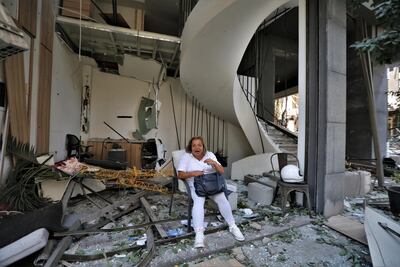The initial shock caused by two massive blasts in Beirut’s port on Tuesday evening morphed into anger on Wednesday as the Lebanese people came to grips with the scale of the disaster that killed more than one hundred people.
As bodies were still being pulled from the rubble, groups of volunteers had brought water and food to one of the hardest-hit neighbourhoods, Gemmayze, which is less than one kilometre away from the explosion site.
“This is the last straw” said Michel, one of the activists distributing food in front of the country’s national electricity company, Electricité du Liban, which has only been able to secure a few hours of power a day for the past weeks.
Most shops remained closed as people cleaned the rubble and cleared the streets, blocked by smashed cars, cement slabs and fallen trees. Traffic clogged the city’s main arteries as cars struggled because of the broken glass that lay littered on footpaths and roads.
“We will give a few days to the government to bury the dead and clear this out, but then we are picking up our weapons and fighting to get rid of this government and Hezbollah” he continued, visibly upset.
Michel said that he came from Jal El Dib, a suburb north of Beirut that was one of the centres of Lebanon’s anti-government protests that broke out last October as the country started sliding into the worst economic crisis in its history.
Protesters demanded an end to decades of corruption and nepotism which, they said, caused the collapse of the country’s economy.
Though Michel said he was not affiliated to any political party, Jal El Dib is an area dominated by the Lebanese Forces, a Christian party that is fiercely opposed to Hezbollah, the only group that has the right to its own weapons. Hezbollah, as well as several other parties, backed the latest government formed in January.
Initial investigations into the blast point to inaction and negligence over the storage of highly explosive material, reported Reuters, quoting an unnamed official source.
Anger was not only simmering in Gemmayze. A few hundred metres away, central Beirut was also reeling from the damage caused by the explosion, which severely damaged landmark buildings, including one belonging to local newspaper, Annahar.
Local media reported that protesters berated former Prime Minister Saad Hariri, who resigned last October following massive social unrest. As Mr Hariri visited central Beirut to inspect the damage, a dozen people chanted "revolution, revolution" at him, telling him that he should "not dream" to come back to power, Lebanese daily L'Orient-Le Jour reported.
Following the incident, supporters of Mr Hariri attacked protesters with stones and sticks, wounding several of them. The phase “hang up the nooses” was trending on Lebanese Twitter on Wednesday afternoon as fury at the country’s political class grew.
A little further away from the blast site, in the neighbourhood of Sassine, people were still in shock from the blast.
“I saw on the news that my IT shop in Mar Mkhael (near Gemmayze) was completely destroyed” said one man as he sipped coffee. “I don’t want to go see it myself. What can I do?”
Standing with him, his friend, a hairdresser who was wounded on his face and arms, said he was happy to be alive. His salon's glass facade had collapsed while he was inside.
“The government said that it was ammonium nitrate,” used in fertilisers and bombs, said the IT shop owner. “We don’t know what to believe. There are so many rumours.
“We are just still in shock. This is the worst explosion in my lifetime. Worse than the 2006 [Israel-Hezbollah] war. Worse than [Rafik] Hariri’s assassination” in 2005, he said.
A few metres away, a bakery continued to operate normally, miraculously undamaged. Lebanon has less than a month's reserve of grain after the country's main silo was destroyed in Tuesday's blast, but the economy minister said there was enough flour to avoid a crisis.
“I bought flour this morning without any problem,” said Paul Boulos, owner of Seal Slim bakeries, which operates three branches in Beirut and its suburbs. Another one of his shops was shattered in the blast, he said. “I have no idea what will happen now. But I’ll re-open even without glass windows. We have to work to live.”




















